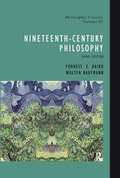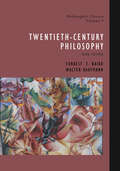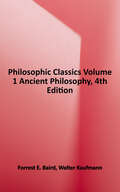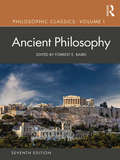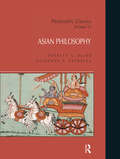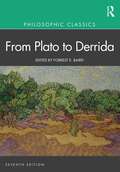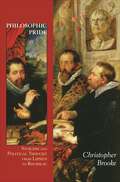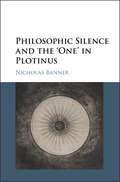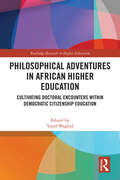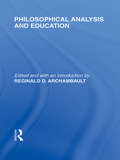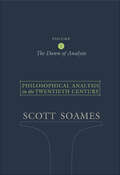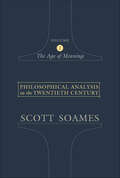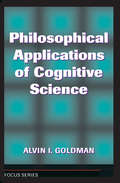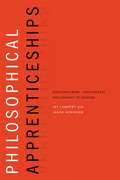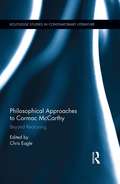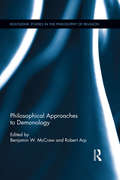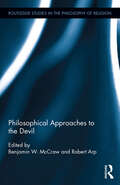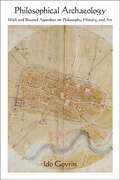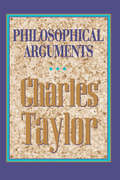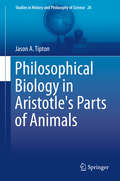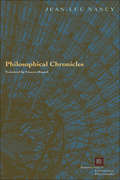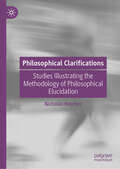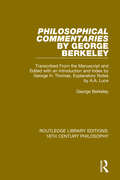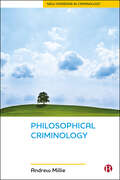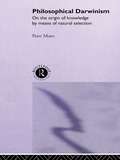- Table View
- List View
Philosophic Classics, Volume IV: Nineteenth-Century Philosophy
by Forrest BairdThis anthology of readings in contemporary Western philosophy focuses on 19th-century philosophers who represent a variety of responses to the issue of their day: whether or not there was a knowable, nonhuman rational order upon which thinking persons could willfully choose to act. The selections are readable and accessible, yet remain faithful to the original works. Accompanying the text are drawings, diagrams, photographs, and a timeline; all of which allow the reader to really study the major philosophical thinkers of the 19th-century: Bentham, Wollstonecraft, Fichte, Hegel, Schopenhauer, Comte, Feuerbach, Mill, Kierkegaard, Marx, Peirce, James, and Nietzche. For anyone interested in owning a collection of works from the greatest philosophical thinkers in the 19th-century.
Philosophic Classics, Volume V: 20th-Century Philosophy
by Forrest BairdFor courses in 20th-century Philosophy, recent Continental Philosophy, Anglo-American Philosophy; as part of courses in Contemporary Philosophy; or courses on Epistemology or Metaphysics that take a historical approach.This anthology in 20th-century philosophical classics includes recent European and American philosophers, and contains texts that are presently seen as classics or as emerging classics. It features complete works or complete sections of works. Includes introductions to each philosopher, an abundance of drawings, diagrams, photographs, and a timeline.
Philosophic Classics: Ancient Philosophy
by Forrest E. BairdFor courses in Ancient Philosophy. Designed to be accessible to today's students, this anthology of readings in Ancient Western philosophy focuses on the writings of the most important Greek philosophers, along with selections from some of their Roman followers. Striking a balance between major and minor figures, it features the best available translations of texts--complete works or complete selections of works--which are both central to each philosopher's thought and are widely accepted as part of the "canon." The selections are readable and accessible, while still being faithful to the original. Introductions to each philosopher; an abundance of drawings, diagrams, photographs; and a timeline keep students focused throughout.
Philosophic Classics: Ancient Philosophy (Philosophic Classics)
by Forrest BairdThe third edition of a undergraduate text which collects writings of important philosophical figures dating from the late 1500s to the late 1700s. Presented are excerpts from prominent works by Francis Bacon, RenT Descartes, Thomas Hobbes, Blaise Pascal, Baruch Spinoza, John Locke, Gottfried Leibniz
Philosophic Classics: Asian Philosophy, Volume VI (Philosophic Classics)
by Forrest BairdAccessible to today‘s readers, this anthology of readings is a survey of Asian thought in India and China. It strikes a balance between major and minor figures, and features the best available translations of texts complete works or complete sections of works which are both central to each thinker or school and are widely accepted to be part of the emerging Asian canon. Introductions to each historical period and to each thinker, photographs, and a timeline help to keep learners focused throughout. For individuals interested in learning about World Religions, Asian thought, or Chinese and Indian philosophy.
Philosophic Classics: From Plato to Derrida (Philosophic Classics)
by Forrest E. BairdPhilosophic Classics: From Plato to Derrida includes essential writings of the most important philosophers from almost two millennia of Western philosophy. In updating this Seventh Edition, editor Forrest E. Baird has continued to follow the same criteria established by the late-Walter Kaufmann when the Philosophic Classics series was first established: (1) to use complete works or, where more appropriate, complete sections of works (2) in clear translations (3) of texts central to each thinker’s philosophy or widely accepted as part of the "canon." To make the works more accessible to students, most footnotes treating textual matters (variant readings, etc.) have been omitted and important words from antiquity have been transliterated and put in angle brackets. In addition, each thinker is introduced by a brief essay composed of three sections: (1) biographical (a glimpse of the life), (2) philosophical (a résumé of the philosopher’s thought), and (3) bibliographical (suggestions for further reading). A timeline places important philosophers alongside other important thinkers, world leaders, and major global events. Photos and paintings with explanatory captions illuminate the ideas, debates, and places discussed in the text. New to the Seventh Edition: New translations: Plato, Euthyphro, Apology, Crito, and Phaedo; Aristotle, Nichomachean Ethics; Epicurus, Letter to Menoeceus and Principal Doctrines; Boethius, The Consolation of Philosophy; Anselm, Proslogion; Giovanni Pico Della Mirandola, Oration on the Dignity of Man; René Descartes, Correspondence with Princess Elizabeth; Gottfried Leibniz, Monadology; Jean-Jacques Rousseau, The Social Contract; Immanuel Kant, Prolegomena to Any Future Metaphysics and Groundwork of the Metaphysics of Morals. Additional material: Porphyry’s Life of Plotinus (in part); Francis Bacon, Aphorisms (selections from Novum Organum); Karl Marx, Theses on Feuerbach; A.J. Ayer, Language, Truth, and Logic (in part). Updated, annotated bibliographies with each bibliography now broken into two sections, one for beginning and another for advanced students.
Philosophic Pride: Stoicism and Political Thought from Lipsius to Rousseau
by Christopher BrookePhilosophic Pride is the first full-scale look at the essential place of Stoicism in the foundations of modern political thought. Spanning the period from Justus Lipsius's Politics in 1589 to Jean-Jacques Rousseau's Emile in 1762, and concentrating on arguments originating from England, France, and the Netherlands, the book considers how political writers of the period engaged with the ideas of the Roman and Greek Stoics that they found in works by Cicero, Seneca, Epictetus, and Marcus Aurelius. Christopher Brooke examines key texts in their historical context, paying special attention to the history of classical scholarship and the historiography of philosophy.Brooke delves into the persisting tension between Stoicism and the tradition of Augustinian anti-Stoic criticism, which held Stoicism to be a philosophy for the proud who denied their fallen condition. Concentrating on arguments in moral psychology surrounding the foundations of human sociability and self-love, Philosophic Pride details how the engagement with Roman Stoicism shaped early modern political philosophy and offers significant new interpretations of Lipsius and Rousseau together with fresh perspectives on the political thought of Hugo Grotius and Thomas Hobbes.Philosophic Pride shows how the legacy of the Stoics played a vital role in European intellectual life in the early modern era.
Philosophic Silence and the ‘One’ in Plotinus
by Nicholas BannerPlotinus, the greatest philosopher of Late Antiquity, discusses at length a first principle of reality - the One - which, he tells us, cannot be expressed in words or grasped in thought. How and why, then, does Plotinus write about it at all? <P><P>This book explores this act of writing the unwritable. Seeking to explain what seems to be an insoluble paradox in the very practice of late Platonist writing, it examines not only the philosophical concerns involved, but the cultural and rhetorical aspects of the question. <P>The discussion outlines an ancient practice of ‛philosophical silence' which determined the themes and tropes of public secrecy appropriate to Late Platonist philosophy. Through philosophic silence, public secrecy and silence flow into one another, and the unsaid space of the text becomes an initiatory secret. Understanding this mode of discourse allows us to resolve many apparent contradictions in Plotinus' thought.<P>Approaches the use of themes of silence and secrecy in Plotinus in a way which accounts for their social and rhetorical, as well as their philosophical, significance.<P> Utilises methodologies from a number of fields, including classics, history of religions, and philosophy.<P> Constructs a model of a mode of discourse - philosophic silence - which determined in part the ways in which Platonist philosophers were expected to engage in public secrecy.
Philosophical Adventures in African Higher Education: Cultivating Doctoral Encounters within Democratic Citizenship Education (Routledge Research in Higher Education)
by Yusef WaghidThis seminal volume delves into some of the doctoral research and pedagogical experiences within an African higher education context, making a case for the transformative potential of education and the integration of African indigenous philosophies into global educational practices.Through a collection of vivid narratives, the book situates philosophy of higher education by embodying the doctoral researcher and their initiation into academic life, revealing how doctoral pursuits in African higher education are not simply academic endeavours but deeply philosophical adventures that challenge, critique, and reimagine the role of education in society. Chapters advocate for a dynamic educational system that, rooted in African philosophies, nurtures democratic citizenship, embraces critical engagement, and fosters social justice. A call to action for researchers, students, and policy makers alike to view doctoral research as a powerful catalyst for change, the book offers fresh perspectives on addressing the continent's unique challenges, contributing to a more just and inclusive world.Ultimately considering the potential of academic research to shape the future of societies, both within Africa and globally, the book will appeal to researchers, academics and postgraduate students involved with the philosophy of education, higher education, and citizenship education, as well as these areas in African contexts specifically.
Philosophical Analysis and Education (International Library of the Philosophy of Education Volume 1)
by Reginald D. ArchambaultWhen originally published in 1965 this book reflected some of the new thinking among philosophers regarding the role of the discipline in its investigation of central issues in educaton. The essays are grouped into four major sections: The Nature and Function of Educational Theory; The Context of Educational Discussion; Conceptions of Teaching; and The Essence of Education. The concepts dealt with are of the first importance to any practical or theoretical discussion in education and the editor provides a generous introduction to the essays to aid the reader in his analysis of the issues.
Philosophical Analysis in the Twentieth Century, Volume 1: The Dawn of Analysis (Philosophical Analysis in the Twentieth Century)
by Scott SoamesThis is a major, wide-ranging history of analytic philosophy since 1900, told by one of the tradition's leading contemporary figures. The first volume takes the story from 1900 to mid-century. The second brings the history up to date. As Scott Soames tells it, the story of analytic philosophy is one of great but uneven progress, with leading thinkers making important advances toward solving the tradition's core problems. Though no broad philosophical position ever achieved lasting dominance, Soames argues that two methodological developments have, over time, remade the philosophical landscape. These are (1) analytic philosophers' hard-won success in understanding, and distinguishing the notions of logical truth, a priori truth, and necessary truth, and (2) gradual acceptance of the idea that philosophical speculation must be grounded in sound prephilosophical thought. Though Soames views this history in a positive light, he also illustrates the difficulties, false starts, and disappointments endured along the way. As he engages with the work of his predecessors and contemporaries--from Bertrand Russell and Ludwig Wittgenstein to Donald Davidson and Saul Kripke--he seeks to highlight their accomplishments while also pinpointing their shortcomings, especially where their perspectives were limited by an incomplete grasp of matters that have now become clear. Soames himself has been at the center of some of the tradition's most important debates, and throughout writes with exceptional ease about its often complex ideas. His gift for clear exposition makes the history as accessible to advanced undergraduates as it will be important to scholars. Despite its centrality to philosophy in the English-speaking world, the analytic tradition in philosophy has had very few synthetic histories. This will be the benchmark against which all future accounts will be measured.
Philosophical Analysis in the Twentieth Century, Volume 2: The Age of Meaning (Philosophical Analysis in the Twentieth Century)
by Scott SoamesThis is a major, wide-ranging history of analytic philosophy since 1900, told by one of the tradition's leading contemporary figures. The first volume takes the story from 1900 to mid-century. The second brings the history up to date. As Scott Soames tells it, the story of analytic philosophy is one of great but uneven progress, with leading thinkers making important advances toward solving the tradition's core problems. Though no broad philosophical position ever achieved lasting dominance, Soames argues that two methodological developments have, over time, remade the philosophical landscape. These are (1) analytic philosophers' hard-won success in understanding, and distinguishing the notions of logical truth, a priori truth, and necessary truth, and (2) gradual acceptance of the idea that philosophical speculation must be grounded in sound prephilosophical thought. Though Soames views this history in a positive light, he also illustrates the difficulties, false starts, and disappointments endured along the way. As he engages with the work of his predecessors and contemporaries--from Bertrand Russell and Ludwig Wittgenstein to Donald Davidson and Saul Kripke--he seeks to highlight their accomplishments while also pinpointing their shortcomings, especially where their perspectives were limited by an incomplete grasp of matters that have now become clear. Soames himself has been at the center of some of the tradition's most important debates, and throughout writes with exceptional ease about its often complex ideas. His gift for clear exposition makes the history as accessible to advanced undergraduates as it will be important to scholars. Despite its centrality to philosophy in the English-speaking world, the analytic tradition in philosophy has had very few synthetic histories. This will be the benchmark against which all future accounts will be measured.
Philosophical Applications Of Cognitive Science
by Alvin I. GoldmanOne of the most fruitful interdisciplinary boundaries in contemporary scholarship is that between philosophy and cognitive science. Now that solid empirical results about the activities of the human mind are available, it is no longer necessary for philosophers to practice armchair psychology.In this short, accessible, and entertaining book, Alvin Goldman presents a masterly survey of recent work in cognitive science that has particular relevance to philosophy. Besides providing a valuable review of the most suggestive work in cognitive and social psychology, Goldman demonstrates conclusively that the best work in philosophy in a surprising number of different fields,including philosophy of science, epistemology, metaphysics, and ethics as well as philosophy of mind,must take into account empirical breakthroughs in psychology.One of those rare texts that will also be useful for professionals, Philosophical Applications of Cognitive Science is appropriate for students in a wide range of philosophy courses. It will also interest researchers and students in psychology who are intrigued by the wider theoretical implications of their work.
Philosophical Apprenticeships: Contemporary Continental Philosophy in Canada (Philosophica)
by Lampert, Jay; Robinson, JasonPhilosophical Apprenticeships gathers fresh and innovative essays written by the next generation of Canada's philosophers on the work of prominent Canadian philosophers currently researching topics in continental philosophy. The authors--doctoral students studying at Canadian universities--have studied with, worked with, or been deeply influenced by these philosophers. Their essays present, discuss, and develop the work of their mentors, addressing issues such as time, art, politics, hermeneutics, and phenomenology. The result is a volume that introduces the reader to the work of current Canadian philosophers and to that of their successors, who will soon be making their own contributions to Canadian continental philosophy. Includes articles by Gabriel Malenfant on Bettina Bergo, Saulius Geniusas on Gary Madison, John Marshall on Samuel Mallin, François Doyon on Claude Piché, Stephanie Zubcic on Jennifer Bates, Alexandra Morrison on Graeme Nicholson, Scott Marratto on John Russon, and Jill Gilbert on John Burbridge.
Philosophical Approaches to Cormac McCarthy: Beyond Reckoning (Routledge Studies in Contemporary Literature)
by Christopher EagleThis book is the first edited collection to explore the role of philosophy in the works of Cormac McCarthy, significantly expanding the scope of philosophical inquiry into McCarthy’s writings. There is a strong and growing interest amongst philosophers in the relevance of McCarthy’s writings to key debates in contemporary philosophy, for example, debates on trauma and violence, on the relationship between language and world, and the place of the subject within history, temporality, and borders. To this end, the contributors to this collection focus on how McCarthy’s writings speak to various philosophical themes, including violence, war, nature, history, materiality, and the environment. Emphasizing the form of McCarthy’s texts, the chapters attend to the myriad ways in which his language effects a philosophy of its own, beyond the thematic content of his narratives. Bringing together scholars in contemporary philosophy and McCarthy Studies, and informed by the release of the Cormac McCarthy Papers, the volume reflects on the theoretical relationship between philosophical thinking and literary form. This book will appeal to all scholars working in the rapidly-growing field of McCarthy Studies, Philosophy and Literature, and to philosophers working on a wide range of problems in ethics, aesthetics, epistemology, Philosophy of Nature, and Philosophy of Film across ancient, modern, and contemporary philosophy.
Philosophical Approaches to Demonology (Routledge Studies in the Philosophy of Religion)
by Robert Arp Benjamin W. McCrawIn contradistinction to the many monographs and edited volumes devoted to historical, cultural, or theological treatments of demonology, this collection features newly written papers by philosophers and other scholars engaged specifically in philosophical argument, debate, and dialogue involving ideas and topics in demonology. The contributors to the volume approach the subject from the perspective of the broadest areas of Western philosophy, namely metaphysics, epistemology, logic, and moral philosophy. The collection also features a plurality of religious, cultural, and theological views on the nature of demons from both Eastern and Western thought, in addition to views that may diverge from these traditional roots. Philosophical Approaches to Demonology will be of interest to philosophers of religion, theologians, and scholars working in philosophical theology and demonology, as well as historians, cultural anthropologists, and sociologists interested more broadly in the concept of demons.
Philosophical Approaches to the Devil (Routledge Studies in the Philosophy of Religion)
by Benjamin W. McCraw & Robert ArpThis collection brings together new papers addressing the philosophical challenges that the concept of a Devil presents, bringing philosophical rigor to treatments of the Devil. Contributors approach the idea of the Devil from a variety of philosophical traditions, methodologies, and styles, providing a comprehensive philosophical overview that contemplates the existence, nature, and purpose of the Devil. While some papers take a classical approach to the Devil, drawing on biblical exegesis, other contributors approach the topic of the Devil from epistemological, metaphysical, phenomenological, and ethical perspectives. This volume will be relevant to researchers and scholars interested in philosophical conceptions of the Devil and related areas, such as philosophers of religion, theologians, and scholars working in philosophical theology and demonology.
Philosophical Archaeology: With and Beyond Agamben on Philosophy, History, and Art (SUNY series in Contemporary Italian Philosophy)
by Ido GovrinOffering, for the first time, a full historicized accounting of philosophical archaeology, Ido Govrin delineates how this overarching method of historical inquiry has today become associated, to a large extent, with the work of Giorgio Agamben—and how it constitutes Agamben’s philosophy of history in particular. As befits a book situated at an intellectual crossroads that brings together a range of discourses—philosophy, history, aesthetics, theology, and philology—Govrin conceives of philosophical archaeology as a multifaceted concept, on a broad scale. The discussion slides along the length of the multilateral fault line and into the related fields of contemporary art and art history/theory. In doing so, it illuminates the potential for philosophical archaeology, as an artistic modus operandi in the broader context of contemporary art, to expand our conception of history and historiographic research, and for this sense of history to expand our conception of art, in turn. At stake in this consideration is the possibility of a new, materially based philosophy of history.
Philosophical Arguments: The Philosophical Argument Of Jürgen Habermas
by Charles TaylorCharles Taylor is one of the most important English-language philosophers at work today; he is also unique in the philosophical community in applying his ideas on language and epistemology to social theory and political problems. In this book Taylor brings together some of his best essays, including “Overcoming Epistemology,” “The Validity of Transcendental Argument,” “Irreducibly Social Goods,” and “The Politics of Recognition.” As usual, his arguments are trenchant, straddling the length and breadth of contemporary philosophy and public discourse. The strongest theme running through the book is Taylor’s critique of disengagement, instrumental reason, and atomism: that individual instances of knowledge, judgment, discourse, or action cannot be intelligible in abstraction from the outside world. By developing his arguments about the importance of “engaged agency,” Taylor simultaneously addresses themes in philosophical debate and in a broader discourse of political theory and cultural studies. The thirteen essays in this collection reflect most of the concerns with which he has been involved throughout his career—language, ideas of the self, political participation, the nature of modernity. His intellectual range is extraordinary, as is his ability to clarify what is at stake in difficult philosophical disputes. Taylor’s analyses of liberal democracy, welfare economics, and multiculturalism have real political significance, and his voice is distinctive and wise.
Philosophical Biology in Aristotle's Parts of Animals
by Jason A. TiptonThis book provides a detailed analysis of Aristotle's Parts of Animals. It presents the wealth of information provided in the biological works of Aristotle and revisits the detailed natural history observations that inform, and in many ways penetrate, the philosophical argument. It raises the question of how easy it is to clearly distinguish between what some might describe as "merely" biological and the philosophical. It explores the notion and consequences of describing the activity in which Aristotle is engaged as philosophical biology. The book examines such questions as: do readers of Aristotle have in mind organisms like Ascidians or Holothurians when trying to understand Aristotle's argument regarding plant-like animals? Do they need the phenomena in front of them to understand the terms of the philosophical argument in a richer way? The discussion of plant-like animals is important in Aristotle because of the question about the continuum between plant and animal life. Where does Aristotle draw the line? Plant-like animals bring this question into focus and demonstrate the indeterminacy of any potential solution to the division. This analysis of Parts of Animals shows that the study of the nature of the organic world was Aristotle's way into such ontological problems as the relationship between matter and form, or form and function, or the heterogeneity of the many different kinds of being.
Philosophical Chronicles (Perspectives in Continental Philosophy)
by Jean-Luc NancyIn eleven brief, engaging talks originally broadcast on French public radio, Jean-Luc Nancy offers a philosopher’s rough and ready account of some of the pressing questions of our day and addresses chronic issues within philosophical inquiry. The fundamental question, which recurs again and again, is whether philosophy is conditioned by the world the philosopher inhabits, or whether it must remain unconditioned by that world.Nancy discusses: terror in relation to religion and capitalism; the relevance of philosophy to life (whether philosophy can be a form of life); the status of god in monotheism; the relevance of “politics” as it is defined today; the “Heidegger affair” and its consequences for philosophy; war, especially in the context of the invasion of Iraq; the role of negativity in philosophical and cultural discourses; “art” and the variability of its meanings; the predominance of the metaphor of the sun. The essays can be read separately, but together they amount to the striking vision of a philosopher sensitive to the world of his times and attempting to open his own path within it.
Philosophical Clarifications: Studies Illustrating the Methodology of Philosophical Elucidation
by Nicholas RescherThis book is an integrated series of philosophical investigations that offers significant new insights into key philosophical concerns ranging from methodological issues to substantive doctrines. Consisting of three sections, it first deals with the nature of philosophizing itself and seeks to illustrate the project from the angle of the pragmatic tradition. The second section is devoted to issues of knowledge and how the cognitive project goes about producing results that are cogent and objective. The third and closing section considers how the ideas and perspectives of these considerations can be applied and implemented in various matters of personal judgment and practice.
Philosophical Commentaries by George Berkeley: Transcribed From the Manuscript and Edited with an Introduction by George H. Thomas, Explanatory Notes by A.A. Luce (Routledge Library Editions: 18th Century Philosophy #12)
by George BerkeleyThis edition of George Berkeley’s Philosophical Commentaries, first published in 1989, provides an accurate transcription of Berkeley’s manuscript, and introduction to set it in perspective, extensive notes to aid in interpreting it, and a full index to facilitate the use of it.
Philosophical Criminology (New Horizons in Criminology)
by Andrew MilliePhilosophical criminology asks big questions about how we get on with one another and what happens when we do not. This accessible book in the New Horizons in Criminology series is the first to foreground this growing area. The book is structured around six philosophical ideas concerning our relations with others: values, morality, aesthetics, order, rules and respect. Building on the author’s theoretical and empirical research, the book considers the boundaries of criminology and the scope for greater exchange between criminology and philosophy. The book is illustrated using examples from a range of countries, and provides a platform for engaging with important topical issues using philosophical and theoretical insights.
Philosophical Darwinism: On the Origin of Knowledge by Means of Natural Selection
by Peter MunzPhilosophers have not taken the evolution of human beings seriously enough. If they did, argues Peter Munz, many long standing philosophical problems would be resolved. One of philosophical concequences of biology is that all the knowledge produced in evolution is a priori , i.e., established hypothetically by chance mutation and selective retention, not by observation and intelligent induction. For organisms as embodied theories, selection is natural and for theories as disembodied organisms, it is artificial. Following Popper, the growth of knowledge is seen to be continuous from the amoeba to Einstein'. Philosophical Darwinism throws a whole new light on many contemporary debates. It has damaging implications for cognitive science and artificial intelligence, and questions attempts from within biology to reduce mental events to neural processes. More importantly, it provides a rational postmodern alternative to what the author argues are the unreasonable postmodern fashions of Kuhn, Lyotard and Rorty.
